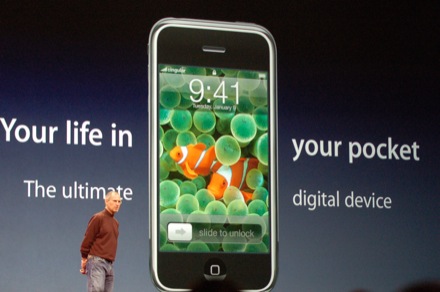AAPL
iPhone Lockup
 I’ve found the fracas regarding Apple (AAPL) and the recent release of software for the iPhone rather ironic and worthy of comment.
I’ve found the fracas regarding Apple (AAPL) and the recent release of software for the iPhone rather ironic and worthy of comment.
The iPhone was introduced as a standalone consumer electronic device with little or no modification possible by third parties. In the months since launch, the iPhone attracted hackers by the dozens who bypassed the phones security functions to add many interesting applications, as well as unlock the device for use on any GSM/EDGE network.
Enough about Apple!
The mornings RSS News Feed reader is bursting with news and opinion about Apple (AAPL), the IPhone price cut, and who did what to whom and why. Continue reading
iPhone Pr0n
It was only hours after the Apple (AAPL) iPhone went on sale that the first device teardowns appeared. The shortest but most comprehensive can be found here.
Apple iPod Growth 2002-2007
Blackfriars shares a jaw-dropping graph of Apple’s (AAPL) iPod/iTunes growth. The only platform that draws comparison is Microsoft Windows, which is now the ubiquitous enterprise computing platform. Charts like the one below are strong evidence Apple is on it’s way to be the ubiquitous consumer media platform.
Apple iTV - Intel and NVIDIA Inside
Anandtech released the first Apple (AAPL) iTV hardware teardown accompanied by excellent analysis. Here are my takeaways, aided by their astute photos and observations.
Apple Lust
Microsoft Windows is the Tin Man of the computing world. It has no heart.
Intel Inside the Sun
 Intel (INTC) has nearly completed a complete clawback of server market supremacy with today’s announcement that Sun Microsystems (SUNW) will closely collaborate with Intel. After substantially improving their devices and surpassing the benchmarks set by AMD (AMD), Intel is back in the drivers seat when it comes to high margin server CPUs. This was an outcome I felt was never in doubt.
Intel (INTC) has nearly completed a complete clawback of server market supremacy with today’s announcement that Sun Microsystems (SUNW) will closely collaborate with Intel. After substantially improving their devices and surpassing the benchmarks set by AMD (AMD), Intel is back in the drivers seat when it comes to high margin server CPUs. This was an outcome I felt was never in doubt.
iPhone v2.0 is the Real Weapon
 Viewed in the context of last week’s CES, the iPhone’s greatest impact should be felt by incumbents. Why? The iPhone has enlightened consumers to the fact that existing mobile phone interfaces suck. But people are mistaken if they think a $599 iPhone is going to sell 10M units in 2008. It will take a $299 iPhone 2.0 to make this happen.
Viewed in the context of last week’s CES, the iPhone’s greatest impact should be felt by incumbents. Why? The iPhone has enlightened consumers to the fact that existing mobile phone interfaces suck. But people are mistaken if they think a $599 iPhone is going to sell 10M units in 2008. It will take a $299 iPhone 2.0 to make this happen.
Nyquist Predictions For 2007
Prediction is an entertaining activity better suited for stimulating discussion than providing an absolute outlook on the future. Therefore, the bolder and more controversial, the better. Keep that in mind as you read and respond.
Level3 and Akamai - The Investment Paradox
Level3 (LVLT) tries very hard to appear hip with the Web 2.0 vibe, and today’s WSJ article cites content distribution (namely video) as the reason for a resurgence of investor interest in carriers. Simultaneously, investors continue to flood liquidity into content delivery networks (CDNs) like Akamai (AKAM), trumpeting them as key enablers of the Web 2.0 content rage. It is impossible for both to be right, as each business is designed to eliminate the need for the other.

